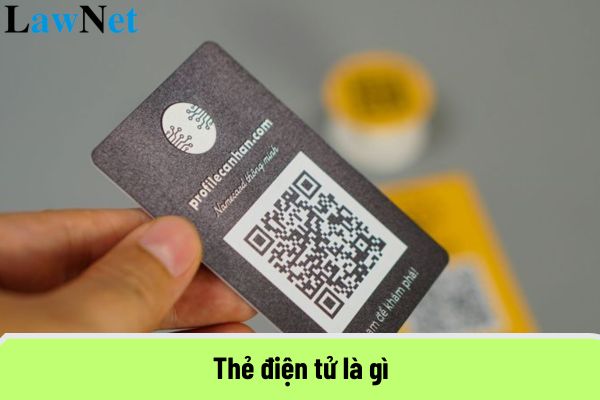What is an e-card? What is the e-invoice form number for an e-card in Vietnam?
What is an e-card in Vietnam?
Currently, the law does not have specific regulations on what an e-card is. However, it can be understood that an e-card is a type of smart card used to store information in digital form. Instead of using a traditional physical card, the e-card operates based on integrated e-chips, allowing for the quick and secure storage and processing of data.
*Note: The above information is for reference only./.
Additionally, based on Clause 2, Article 89 of the Law on Tax Administration 2019, the provisions are as follows:
e-invoice
1. An e-invoice is an invoice with or without a tax authority code, presented in e-data form, created by organizations or individuals selling goods or providing services to log the sale of goods or provision of services in accordance with laws on accounting and tax via e-means, including invoices initiated from cash registers connected to transmit e-data to tax authorities.
2. e-invoices include value-added invoices, sales invoices, e-stamps, e-tickets, e-cards, e-receipts, delivery-cum-internal shipping slips, or other e-documents with different names.
3. An e-invoice with a tax authority code is an e-invoice coded by the tax authority before the organization or individual sells goods or provides services to the buyer.
The tax authority code on the e-invoice includes a unique transaction number generated by the tax authority's system and a string of characters encrypted by the tax authority based on the seller's information recorded on the invoice.
4. An e-invoice without a tax authority code is an e-invoice issued by the organization selling goods or providing services to the buyer without the tax authority's code.
5. the Government of Vietnam specifies the details of this Article.
Thus, an e-invoice will include an e-card.

What is an e-card? What is the e-invoice form number for an e-card in Vietnam? (Image from the Internet)
What is the e-invoice form number for an e-card in Vietnam?
Based on the provisions at Point a, Clause 1, Article 4 of Circular 78/2021/TT-BTC regarding the template symbol, invoice symbol, and invoice sheet name as follows:
Template Symbol, Invoice Symbol, Invoice Sheet Name
1. e-Invoice
a) The e-invoice template symbol is a character with a single digit number being the natural numbers 1, 2, 3, 4, 5, 6 to reflect the type of e-invoice as follows:
- Number 1: Reflecting the type of value-added e-invoice;
- Number 2: Reflecting the type of sales e-invoice;
- Number 3: Reflecting the type of public asset sale e-invoice;
- Number 4: Reflecting the type of national reserve sales e-invoice;
- Number 5: Reflecting other types of e-invoices such as e-stamps, e-tickets, e-cards, e-receipts, or other e-documents with names but containing the content of an e-invoice as stipulated in Decree No. 123/2020/ND-CP;
- Number 6: Reflecting e-documents that are used and managed like invoices, including delivery-cum-internal transport slips, consignment warehouse slips for goods sent for sale by agency.
b) The e-invoice symbol is a group of 6 characters that include both letters and numbers, representing the e-invoice symbol to reflect the information related to the type of e-invoice with or without a tax authority code, the year of issuance, and the type of e-invoice used. These six (06) characters are stipulated as follows:
Thus, the e-card has an e-invoice template symbol of number 5.
Additionally, the e-invoice template symbol of number 5 also reflects other types of e-invoices such as e-stamps, e-receipts, or other e-documents with different names but containing the content of an e-invoice.
How to apply e-invoices when selling goods, providing services in Vietnam?
Based on Article 91 of the Law on Tax Administration 2019, the application of e-invoices when selling goods and providing services is stipulated as follows:
- Enterprises and economic organizations use e-invoices with the tax authority code when selling goods or providing services, regardless of the value for each sale or service provision, except in cases specified in Clauses 2 and 4 of Article 91 of the Law on Tax Administration 2019.
- Enterprises operating in sectors such as electricity, petroleum, telecommunications, clean water, credit finance, insurance, health, e-commerce, supermarkets, trade, air transport, road, rail, sea, and inland waterway businesses, and economic organizations that have or will conduct transactions with the tax authority through e-means, who have built information technology infrastructure, and have accounting software systems that meet the requirements for creating, searching, and storing e-data according to regulations and ensuring the transmission of e-data to the buyer and to the tax authority, may use e-invoices without a tax authority code when selling goods or providing services, regardless of the value for each sale or service provision, except in cases of high tax risk as stipulated by the Minister of Finance and cases registering for e-invoices with the tax authority code.
- Business households and individuals falling under the provisions of Clause 5, Article 51 of the Law on Tax Administration 2019 and other cases where revenue can be determined upon selling goods and services use e-invoices with the tax authority code when selling goods or providing services.
- Business households and individuals that do not meet the conditions to use e-invoices with the tax authority code as prescribed in Clauses 1 and 3, Article 91 of the Law on Tax Administration 2019 but need invoices for delivery to customers, or instances where enterprises, economic organizations, or other organizations are approved by the tax authority to issue e-invoices for delivery to customers, shall be issued e-invoices with the tax authority code on each occurrence and must declare and pay taxes before the tax authority issues e-invoices for each occurrence.

